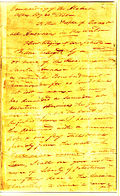Portal:Society
Sociology portals: Arts · Anthropology · Community · Culture · Economics · Education · Geography · Gender studies · Globalization · History · Human rights · Internet · Law · Philosophy · Social movements · Social sciences · Social welfare and social work · Society
The Society PortalA human society is a group of people related to each other through continued relations, or a large social grouping sharing the same geographical or virtual territory, same interests, subject to the same political authority and dominant cultural expectations. Human societies are characterized by patterns of relationships (social relations) between individuals who share a distinctive culture and institutions. A given society may be described as the sum total of such relationships among its constituent members. In the social sciences, a larger society often evinces stratification and/or dominance patterns in subgroups. In so far as it is collaborative, a society can enable its members to benefit in ways that would not otherwise be possible on an individual basis; both individual and social (common) benefits can thus be distinguished, or in many cases found to overlap. A society can also consist of like-minded people governed by their own norms and values within a dominant, larger society. This is sometimes referred to as a subculture, a term used extensively within criminology: an organized group working together having a common interests, beliefs, or profession. More broadly, a society may be described as an economic, social, or industrial infrastructure, made up of a varied collection of individuals or subgroups. Members of a society may be from different ethnic groups. A society can be a particular ethnic group, such as the Saxons; a nation state, such as Bhutan; or a broader cultural group, such as a Western society. The word society may also refer to an organized voluntary association of people for religious, benevolent, cultural, scientific, political, patriotic, or other purposes. A "society" may also be a group of social organisms such as an ant colony, or any cooperative aggregate such as, for example, in some formulations of artificial intelligence.
Selected article
To the People of Texas & All Americans in the World is an open letter written on February 24, 1836, by William B. Travis, commander of the Texian forces at the Battle of the Alamo, to settlers in Mexican Texas. On February 23, the Alamo Mission in San Antonio, Texas, had been besieged by Mexican forces led by General Antonio López de Santa Anna. Fearing that his small group of men could not withstand an assault, Travis wrote this letter seeking reinforcements and supplies from supporters. The letter was initially entrusted to courier Albert Martin, who carried it to Gonzales and then handed the letter to Launcelot Smithers. Partially in response to the letter, men from throughout Texas and the United States began to gather in Gonzales. Between 32 and 90 of them reached the Alamo before it fell; the remainder formed the nucleus of the army which eventually defeated Santa Anna at the Battle of San Jacinto. After the Texas Revolution, the original letter was delivered to Travis's family in Alabama, and in 1893, one of his descendants sold it to the State of Texas. For many decades it was displayed at the Texas State Library; the original letter is now protected and a copy is on display under a portrait of Travis.
Featured pictureA scene from Oscar Wilde's 1895 play An Ideal Husband, originally published in a 1901 collected edition of Wilde's works. The comedy, which opened January 3, 1896, at the Haymarket Theatre in London, revolves around blackmail and political corruption, and touches on the themes of public and private honour. It has been adapted into television, radio/audio, and three films. The published version differs slightly from the performed play, for Wilde added many passages and cut others. Prominent additions included written stage directions and character descriptions. Wilde was a leader in the effort to make plays accessible to the reading public. Did you know...
Anniversaries this month
Selected biography
Mary Anning (1799–1847) was a British fossil collector, dealer and palaeontologist who became known around the world for important finds she made in the Jurassic marine fossil beds at Lyme Regis where she lived. Her work contributed to fundamental changes in scientific thinking about prehistoric life and the history of the earth. Her discoveries included the first ichthyosaur skeleton to be correctly identified, found when she was just twelve years old; the first two plesiosaur skeletons ever found; the first pterosaur skeleton located outside Germany; and important fish fossils. Her observations were critical to the discovery that coprolites were fossilised faeces. Her gender and social class prevented her from fully participating in the scientific community of 19th-century Britain and she struggled financially for much of her life. As a woman she was not eligible to join the Geological Society of London, and she did not always receive full credit for her scientific contributions. After her death her unusual life story attracted increasing interest. In 2010 the Royal Society included Anning in a list of the ten British women who have most influenced the history of science.
Featured audioGeorge W. Bush's address, given on the first floor of the House of Representatives at the Capitol.
CategoriesWikiProjectsSelected quoteRecognized contentFeatured articlesFeatured listsGood articles
Featured picturesThings you can do
Related portalsWeb resources
Associated Wikimedia
|









